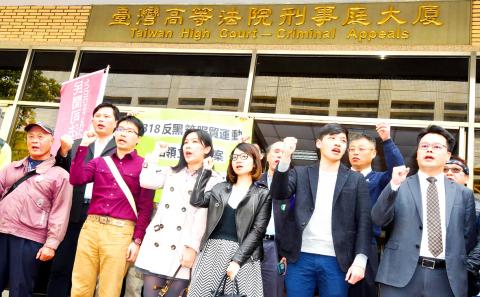The Taiwan High Court yesterday upheld the “not guilty” verdict for the 22 defendants who occupied the Legislative Yuan during a protest in 2014, saying they were exercising their right to political dissent and freedom of speech.
The 22 were first acquitted in March last year and public prosecutors are unlikely to appeal yesterday’s decision in accordance with the Criminal Speedy Trial Act (刑事妥速審判法) of 2010.
The defendants and other protesters stormed the legislature on March 18, 2014, and occupied the legislative chamber for almost 23 days in what became known as the Sunflower movement.

Photo: Liu Hsin-de, Taipei Times
The defendants included members of different activist groups, such as Lin Fei-fan (林飛帆), Chen Wei-ting (陳為廷), Huang Kuo-chang (黃國昌), Tsay Ting-kuei (蔡丁貴) and Wei Yang (魏揚). While the Taipei District Court acquitted the group on charges of “civil disobedience,” the High Court based its decision on the protection of freedom of speech and right to dissenting views.
Reading the court’s ruling, High Court spokesman Chiu Chung-yi (邱忠義) said that the defendants acted in response to Chinese Nationalist Party (KMT) Legislator Chang Ching-chung (張慶忠) and other KMT lawmakers’ rush to pass the cross-strait service trade agreement draft bill through a legislative subcommittee without following proper procedures.
The defendants’ action “did not cause any clear and immediate danger,” Chou said, adding that according to Council of Grand Justices’ Interpretation No. 455, the defendants should be given protection under freedom of speech, for which they should not be oppressed or punished in the aftermath of their undertaken acts.
The High Court determined that the group was “urging other protesters to enter the legislature together as a group to express their discontent and opposition to the cross-strait agreement.”
“They were not maligning and vilifying indiscriminately, nor did they incite the crowd to commit acts of violence against the government,” the ruling said.
“At that time, the draft bill was headed for a vote in the legislature within three days. The defendants decided that occupying the legislature was their only recourse, as they perceived there was insufficient time and no other effective way to block the draft bill,” it said.
“That people can express contrary opinions on public affairs issues demonstrates the freedom of expression that Taiwan’s society has fought to earn through very difficult circumstances,” it said.
“The acquittal proves that the cross-strait agreement had done grave harm to our constitutional democracy. We are not guilty, but the real guilty ones are [then-president] Ma Ying-jeou (馬英九) and his government, and KMT Legislator Chang Ching-chung, who tried to ram the draft bill through by using illegal and unconstitutional means,” said Huang, now New Power Party executive chairman.
Chen said the ruling serves as a message to Chinese President Xi Jinping (習近平) “that you could be an emperor and extend your rule indefinitely, but Taiwan is a democratic nation.”
“Xi should not infringe on Taiwan’s territory, because Taiwanese will rise and fight, and our democracy and the judiciary will protect the public’s rights,” Chen said.

CHAOS: Iranians took to the streets playing celebratory music after reports of Khamenei’s death on Saturday, while mourners also gathered in Tehran yesterday Iranian Supreme Leader Ayatollah Ali Khamenei was killed in a major attack on Iran launched by Israel and the US, throwing the future of the Islamic republic into doubt and raising the risk of regional instability. Iranian state television and the state-run IRNA news agency announced the 86-year-old’s death early yesterday. US President Donald Trump said it gave Iranians their “greatest chance” to “take back” their country. The announcements came after a joint US and Israeli aerial bombardment that targeted Iranian military and governmental sites. Trump said the “heavy and pinpoint bombing” would continue through the week or as long

TRUST: The KMT said it respected the US’ timing and considerations, and hoped it would continue to honor its commitments to helping Taiwan bolster its defenses and deterrence US President Donald Trump is delaying a multibillion-dollar arms sale to Taiwan to ensure his visit to Beijing is successful, a New York Times report said. The weapons sales package has stalled in the US Department of State, the report said, citing US officials it did not identify. The White House has told agencies not to push forward ahead of Trump’s meeting with Chinese President Xi Jinping (習近平), it said. The two last month held a phone call to discuss trade and geopolitical flashpoints ahead of the summit. Xi raised the Taiwan issue and urged the US to handle arms sales to

State-run CPC Corp, Taiwan (CPC, 台灣中油) yesterday said that it had confirmed on Saturday night with its liquefied natural gas (LNG) and crude oil suppliers that shipments are proceeding as scheduled and that domestic supplies remain unaffected. The CPC yesterday announced the gasoline and diesel prices will rise by NT$0.2 and NT$0.4 per liter, respectively, starting Monday, citing Middle East tensions and blizzards in the eastern United States. CPC also iterated it has been reducing the proportion of crude oil imports from the Middle East and diversifying its supply sources in the past few years in response to geopolitical risks, expanding

OTHER OPTIONS: Given possible US intervention and Taiwanese counterattacks, China might opt to blockade Taiwan or take its outlying islands instead of an all-out invasion A US think tank has urged Taiwan to adopt a “hellscape” strategy that would flood the Taiwan Strait with drones and other uncrewed systems to deter invasion by China. In its report, Hellscape for Taiwan, published on Thursday, the Center for a New American Security said Taipei’s asymmetric defense approach — often described as a “porcupine strategy” — needs to evolve to keep pace with the growing capabilities of the Chinese People’s Liberation Army. The “hellscape” strategy involves saturating the air and waters around Taiwan with thousands of drones and other platforms capable of striking invading forces from multiple domains at once. Long-range